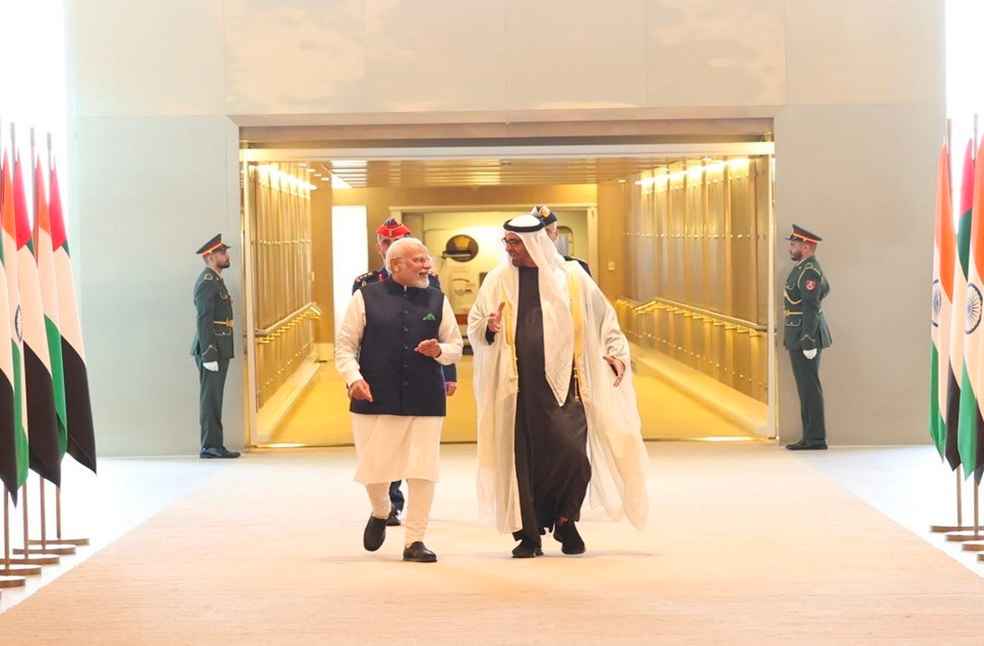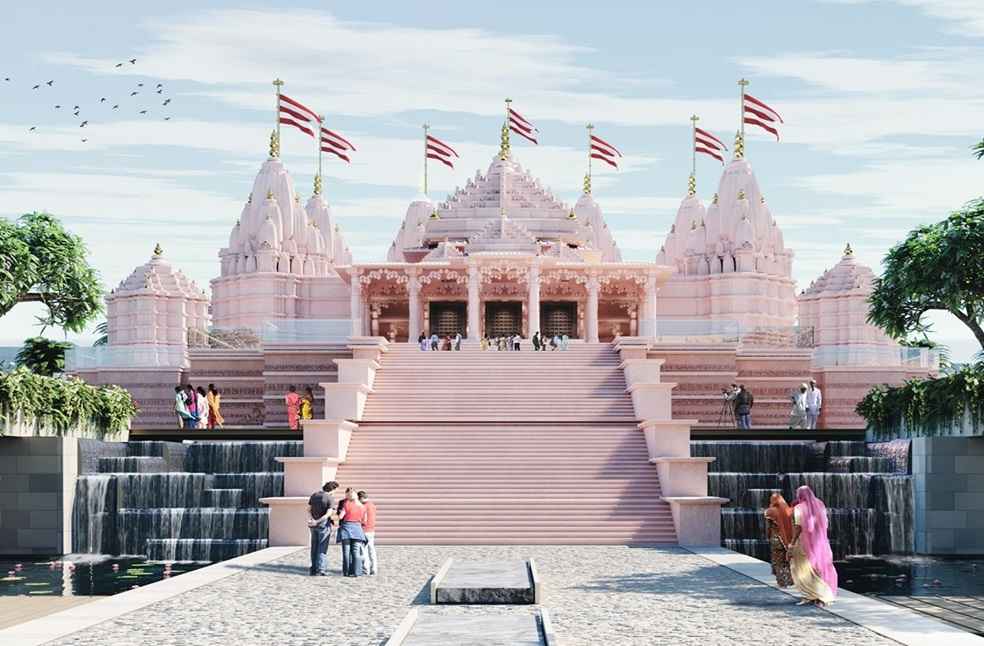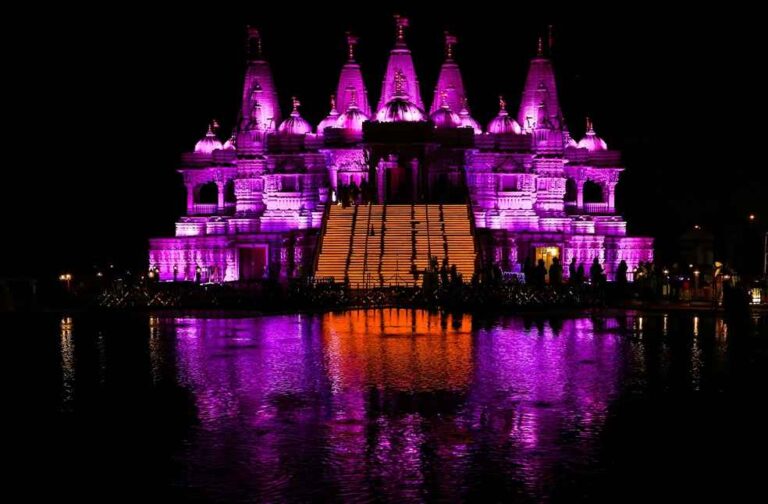Abu Dhabi: India’s Prime Minister, Narendra Modi will inaugurate the BAPS Mandir, that represents a socio-spiritual Hindu faith rooted in the Vedas, pioneered by Bhagwan Swaminarayan in the late 18th century and formally established in 1907 by Shastriji Maharaj.
The construction of BAPS Mandir, which reportedly called as Middle East’s first traditional Hindu stone temple, has been a long and arduous journey filled with many noteworthy achievements. In a short period following the inauguration of the Ram Mandir in Ayodhya, Uttar Pradesh, this event assumes a great deal of significance.
The Bochasanwasi Akshar Purushottam Swaminarayan Sanstha, or BAPS, consecrated the Hindu temple in Abu Dhabi prior to the inauguration of Prime Minister Narendra Modi on February 14. The temple in Abu Dhabi represents a unique blend of the cultures and histories of the two nations. March 1 marks the start of public access.
“The construction of the BAPS temple here would not have been possible without your support,” the Prime Minister stated in a bilateral meeting with the President of the UAE. In 1997, Pramukh Swami Maharaj prayed and wished to build a temple in Sharjah, the capital of the UAE. “May there be a mandir (temple) in Abu Dhabi, which will bring countries, cultures, communities and religions closer together,” Maharaj said.
BAPS Swaminarayan Mandir saint Brahmviharidas Swami stated that, “The mandir has come not from great negotiations or great presentations, or great appeals. It has come from natural love and natural friendship. One fact that I would like to tell all Indians staying here, is that our forefathers who have created such a great impression of integrity, that things like this are going to happen more and more. it is love beyond belief. All the people and rulers I have met have only good things to say about India and its culture.”

Knowing history of Hinduism in the United Arab Emirates
Firstly, there is misinformation spreading all over the world that BAPS Mandir is the first Hindu temple to be opened. Most of the media portals say the same and readers also believe the news without checking the facts. A country that was entirely devoted to Islam is described in the very first periods of UAE history. The construction of the first Hindu temple in an Islamic country took place 60 years ago in 1958. In those days, there were very few Hindus in the country since they were emigrants seeking employment.
Sheikh Rashid bin Saeed al Maktoum gave permission for the construction of the first Hindu temple on the first floor of a group of old-fashioned shops located in the historical district of Bur Dubai. This shopping centre is now known as “Bur Dubai Old Souk”. The temple complex originally housed the Shiva Mandir, Krishna Mandir, and Gurudwara.
Within the temple, there was a prayer hall with two altars, one for Shiva and the other for Krishna, and a third altar for the Gurudwara. Beneath the temple hall, there were several small old-fashioned shops. The shopping centre does not have a recognizable entrance, and to comply with government laws on noise control, walls were built to make the structure soundproof due to its location in a small crowded market.
On January 3, 2024, the Shiva Mandir and Gurudwara ceased operations at their former location in the Bur Dubai complex and relocated to the Hindu Temple, situated in the Jebel Ali district of Dubai. The Krishna Mandir, on the other hand, is still located in the temple complex in Bur Dubai.
The Hindu temple in Jebel Ali, Dubai, is an exquisite blend of traditional and contemporary architecture. The interior of the central dome is stunning. A stunning 3D-printed pink lotus dominates the prayer hall, surrounded by marble pillars that are intricately carved with elephants that are adorned with bells and flowers. The temple features walnut doors with delicate craftwork.
The Hindu temple located in Jebel Ali is a permanent abode for over 16 Hindu deities. It provides numerous facilities for devotees and is situated on Dubai’s Corridor of Tolerance in Jebel Ali. There are several other religious institutions in the vicinity, including churches and a Sikh Gurdwara. Due to its size, the temple attracts devotees from all parts of the city. It is one of the most popular places to celebrate Hindu festivals. Online registration is available through the official website of Jebel Ali Temple.
But nowadays, in Arab countries or anywhere in the world, the number of Hindus has increased in the population. In Arab countries, Hinduism also receives support allowing the construction of prayer rooms at home. Having one’s own temple at home reduces the need for a public place of worship. But still people find reasons to build more public places of worship without thinking about the need for it.

BAPS Mandir In UAE
The temple was constructed for Rs 700 crore in the Abu Mreikhah area. During Prime Minister Modi’s visit to Abu Dhabi in 2015, Abu Dhabi Crown Prince Sheikh Mohammed bin Zayed Al Nahyan donated 13.5 acres of land to build the temple. There is a Hindu sect known as BAPS or Bochasanwasi Akshar Purushottam Swaminarayan Sanstha, known for its reverence for Swaminarayan, an incarnation of Lord Krishna. They led the construction of the temple.
Spread over an area of 27 acres, this architectural wonder has a prayer hall that can accommodate 3,000 devotees, a community centre, an exhibition hall and various other facilities. Built in the traditional Nagar style, the foundation stone of this temple was laid in April 2019.
Intricate details are evident in the use of 1.80 lakh cubic feet of pink Rajasthan sandstone, 50,000 cubic feet of Italian marble, and 18 lakh bricks. With its 108-foot-tall tower adorned with seven spires representing each of the emirates of the UAE, the temple is a testament to the architectural excellence of the UAE.
The temple features intricately designed images of the sacred rivers Ganga and Yamuna, while the entrance features eight idols that represent the core values of Sanatana Dharma. This temple’s design depicts the elements of nature and life intricately in keeping with the ethos of human harmony.
Furthermore, the temple complex serves as a cultural centre, with a visitor centre, prayer halls, educational spaces, sports facilities, and themed gardens. Each of the seven shrines is dedicated to a different deity, representing the essence of their teachings and stories. By incorporating fly ash into the construction of the temple, the temple reduces its carbon footprint. Visitors are provided with comfort in all weather conditions, while rigorous surveillance systems guarantee the integrity and safety of the building.
Prime Minister Modi will address the Indian diaspora in the UAE following the inauguration, emphasizing the importance of this important event in strengthening cultural ties between India and the UAE.
MOST READ | Global governance has failed to meet world’s biggest challenges; Modi



